- Home
- Muriel Spark
Loitering With Intent Page 7
Loitering With Intent Read online
Page 7
I said yes, sometimes. I set about making tea, so much to the renewed astonishment of Maisie in Wonderland that I felt bound to assure her that I often had quite a lot of visitors, five, six, even more, at a time.
‘How do you keep so clean, yourself?’ said Maisie, looking at me with new eyes.
‘There’s a bathroom on every landing. A bath is fourpence a time.’
‘Is that all? ‘.
‘It’s too much,’ I said, and explained how the proprietors made a fortune out of the penny gas meters in the bathrooms and the shilling meters in the rooms, since they got a refund when the meter-man came to collect, which refunded loot was not shared among the clients.
‘I suppose,’ said Maisie, ‘they have to make some sort of a profit.’ I could see whose side she was on and although she then looked round the room enquiringly I didn’t enlighten her as to the rent, lest she should exclaim over its dirt-cheapness.
‘What a lot of books—have you read them all? ‘she said.
Still, I liked her very much. She was merely ignorant about penniless realities, as indeed she was about most realities, but she wasn’t pretentious. Maisie settled down with her tea and biscuit and started saying what she had come to says.
‘Father Egbert Delaney,’ said this handsome girl, ‘believes that Satan is a woman. He told me as much and I think he ought to be made to resign. It’s an insult to women.’
‘It does seem so,’ I said. ‘Why don’t you tell him?’
‘I think you, as secretary, Fleur, should take it up with him and report the matter to Sir Quentin.’
‘But if I tell him Satan is a man he’ll think it an insult to men.’
She said, ‘Personally, I don’t believe in Satan.’
‘Well, that’s all right then,’ I said.
‘What’s all right then?’
‘If Satan doesn’t exist, why bother if it’s man or woman we’re talking about?’
‘It’s Father Delaney we’re talking about. Do you know what I think?’
I said, what did she think?
‘Father Delaney is Satan. Satan himself. You should report the whole thing to Sir Quentin. Sir Quentin insists on complete frankness. It’s time we had a showdown.’
I still liked Maisie Young, she had an air of freedom that she wasn’t herself aware of, and she reminded me as she sat there in my room of my character Marjorie in Warrender Chase. But I didn’t dwell on this at the time; I was thinking of her phrase, ‘Sir Quentin insists on complete frankness.’ It stuck in my mind so that, a few days later when I sat with Eric Findlay in his club and he twice spoke that very phrase, I was convinced that Sir Quentin Oliver had started orchestrating his band of fools. At the moment, sitting with Maisie in my room I was simply irritated by her ‘Sir Quentin insists.’ I said, ‘Complete frankness is always a mistake among friends.’
‘I know what you mean,’ said Maisie. ‘You make out you’re happy to see me but really you don’t like me coming here. I’m only a cripple and a bore to you.’
I was appalled; for the moment that she had turned my generality on to herself she indeed became a very great bore, not merely for the present hour, but stretching into the future; this apprehension of Maisie in the future affected me with a clutching void in my stomach. All in a moment she had seemed to lose that air of a freedom that she would probably never be aware existed.
I said, ‘Oh, Maisie, I had no such thing in mind. I spoke generally. Frankness is usually a euphemism for rudeness.’
‘People should be frank,’ said the wretched girl. ‘I know I’m a cripple and a bore.’
I longed for the telephone to ring but it didn’t, or someone else to come in, but just at that moment nobody did. I murmured something to the effect that a physical disability often proved to be an attraction. She replied sharply that she’d rather not discuss her sex-life. So much for my frankness.
Now Maisie lifted up the book she had brought me. It was the copy of John Henry Newman’s Apologia pro Vita Sua that I had borrowed from the public library for her. ‘Sir Quentin has lent me a copy of his own,’ said Maisie. She was looking at me without really noticing my presence. For a moment I felt like a grey figment, the ‘I’ of a novel whose physical description the author had decided not to set forth. I was still, of course, weak from my ‘flu. She flicked through the pages of the Apologia and found a bit she wanted to read aloud to me. It was the passage, early in the book, where Newman describes his religious feelings as a boy. He felt he was elected to eternal glory. He said the actual belief gradually faded away but that it had an influence on the opinions of his early youth:
… viz. in isolating me from the objects which surrounded me, in confirming me in my mistrust of the reality of material phenomena, and making me rest in the thought of two and two only supreme and luminously self-evident beings, myself and my Creator….
Maisie finished reading. She said, ‘I think that is very, very beautiful and so true.’
Now I got angry. I was impatient with the force of having spent the past three and a half years studying Newman, his sermons, his essays, his life, his theology, and I had done it for no reward, and at the sacrifice of pleasures and happiness which would never come my way again, while Maisie up to the time of her accident had been spending her time at deb dances, riding in the parks of such country-houses as had been restored by the government to their owners after the war, and, since her accident, plotting out with her friends her totally undisciplined theories of the Cosmos. The sacrifice of pleasures is of course itself a pleasure, but I didn’t feel up to such pure reasoning at the time; Maisie’s reading me this well-known passage of Newman and telling me it was beautiful and true irritated me greatly. I said, ‘Newman is describing a passing phase.’
‘Oh, no,’ said Maisie, ‘it goes through and through his book. Two and two only supreme and luminously self-evident beings, my Creator and myself.’
Suddenly I knew there was a sense in which she was right and the whole Newman idea which up to now 1 had thought enchanting took on a different aspect. I had always up to now had a particular liking for this passage, feeling a fierce conviction of its power and general application as a human ideal. But as Maisie uttered the words I felt a revulsion against an awful madness I then discerned in it. ‘… My mistrust of material phenomena … two and two only supreme and luminously self-evident beings, my Creator and myself.’ I was glad of my strong hips and sound cage of ribs to save me from flying apart, so explosive were my thoughts. But I heard myself saying, coldly, ‘It’s quite a neurotic view of life. It’s a poetic vision only. Newman was a nineteenth century romantic.’
‘Do you know,’ she said, ‘there are still people alive who remember Cardinal Newman. He was considered to be an angel.’
‘I think it awful,’ I said, ‘to contemplate a world in which there are only two luminous and self-evident beings, your creator and yourself. You shouldn’t read Newman in that way.’
‘It’s a beautiful thought, a very beautiful—’
‘I’m sorry I ever told you to read the Apologia. It’s a beautiful piece of poetic paranoia.’ This was over-simple, a distortion; but I needed the rhetoric to combat the girl’s ideas.
‘Father Egbert Delaney mentioned it to me first,’ she said. ‘I don’t know how that evil fellow can possibly appreciate the book. But it’s true you also pressed us all to read it as an example of an autobiography.’
‘For my part Father Egbert Delaney is a self-evident and luminous being,’ I said. ‘So are you, so is my lousy landlord and the same goes for everyone I know. You can’t live with an I-and-thou relationship to God and doubt the reality of the rest of life.’
‘Have you told Sir Quentin about your views? ‘Maisie said. ‘Because,’ she said, ‘Sir Quentin insists on complete frankness. He has told us we are all to study the Apologia as an example of autobiographical writing.’
By this time I had calmed down and I was thinking how much unpaid overtime I had saved mysel
f by failing to remind them of Proust and his fictional auto-biography. I wanted to get rid of Maisie and forget the Autobiographical Association for the week-end at least.
Those people and their Sir Quentin were sheets of paper on which I could write short stories, poems, anything I cared. Orgulous and impatient I told Maisie while looking at my watch that I had to make a phone call— ‘Goodness, the time!’ — I moved with these words to the telephone and put through a call to Dottie’s number. She wasn’t in. I put down the receiver and said to Maisie, ‘I’m afraid I’ve missed my friend.’
She was looking straight ahead as if struck by catalepsy, and oblivious of my phoning and fussing. I thought she had been taken badly, but then she spoke in a trance-like way that made me suspect that it was all put on. ‘Father Egbert Delaney is Satan personified. You’ll believe me when I tell you what he said about you, Fleur.’
I was instantly agog. ‘What—did—he—say—about —me?’
She went into another dream-like state. I knew I was being foolish to press her for more, but I was dying to know.
At last she spoke: ‘Your Father Egbert Delaney whom you’re so anxious to protect says that you are trying to persuade Lady Edwina to change her will in your favour. He says Beryl Tims is convinced of it. In fact, many of the others are convinced of it.’
I laughed, but the laughter was artificial, which I hoped didn’t show.
‘Father Egbert Delaney,’ she said, ‘says, why else should you bother to take the awful old crone out for walks and spend so much time with her?’
I prayed for someone to phone me or look in to see me. That my prayer appeared to be answered within a very short time is no proof of its efficacy; it was six o’clock, a time when any of my friends might ring me up or stop to see me on their ways somewhere. Maisie was saying, ‘It’s a question that’s bound to arise, isn’t it? Of course I think Egbert Delaney is thoroughly evil. I’m on your side in this, Fleur, and I don’t think you need, really, explain whys you give so much attention to that disgusting woman.’
‘I need not even explain why I give so much attention to you,’ I said. ‘I daresay you’ll die before me but I don’t expect you to leave me anything in your will.’
‘Oh, Fleur, that’s harsh, that’s brutal of you. How can you speak like that? How can you think of me dying? And I’m on your side, on your side, and I only told you for your own—’
A knock at the door. It opened, and to my surprise Leslie’s poet, who was so literally called Gray Mauser that he wrote under the pseudonym of Leander, put his timid head round the door. Gray had only been to see me once before. I said, ‘Oh, Gray, I’m so glad to see you. Come in!’
He looked very much encouraged by my welcome.
In came the self-evident and luminous little mess. He was small, slight and wispy, about twenty, with arms and legs not quite uncoordinated enough to qualify him for any sort of medical treatment, and yet definitely he was not put together right. I couldn’t have been happier to see him.
‘I only just wondered if perhaps by chance Leslie was here,’ said Gray.
‘Oh, I daresay he’ll be along in a moment,’ I said. I introduced him to Maisie and quickly said she would no doubt be grateful if Gray nipped out to get her a taxi.
He lolloped off to do so immediately, glad to be of help. I followed with Maisie, helping her with her stick and the straps of her handbag twined round her fingers. She was probably upset but I didn’t care to verify it one way or another. I got her into the taxi at the door and went back in, shivering with the cold, followed by Leslie’s poet.
That evening we went off to a pub known for its literary clients where we drank light ale and ate Cornish pasties; in mine, I counted two small diced cubes of steak, Gray found but one among the small bits of potato nestling inside the tough envelope of pastry. And this I find most curious: looking back on it, the idea of that Cornish pasty, day old as it was, is to me revolting but at the time it was delicious; and so I ask, what did I see in that lard-laden Cornish pasty? —in much the same way as I might wonder, now, whatever was the attraction of a man like Leslie?
I sat with Gray at a lone table of the pub. There were one or two well-known poets at the bar at whom we glanced from our respectful distance, for they were far beyond our sphere. I think the poets at the bar on that occasion were Dylan Thomas and Roy Campbell, or it could have been Louis MacNeice and someone else; it made no difference for the point was we felt that the atmosphere was as good as the Cornish pasties and beer, and we could talk. Gray told me about his many troubles. Leslie had gone to Ireland with Dottie three days ago, had promised to be back last night but hadn’t turned up. He had left Gray a consolation present of a grey silk tie with blue spots which Gray was wearing and which he seemed both proud of and saddened by. I had very little to say to Gray Mauser but I remember that sitting with him in the pub that night took the edge off my rage against Maisie Young. I cheered him up by saying that I didn’t really think Leslie was a lady’s man. We decided that men were generally more sentimental than women, but women generally more dependable. Then he took some sheets of crumpled paper out of his pocket and read me a poem about the sickle moon, which he explained was a sexual symbol.
I had never thought highly of Grays, there was so little to think anything of. But just that evening, after we parted and I was on my way home in the Tube, I thought how sane he was compared with Maisie and the Autobiographical Association in general. When I got out at High Street Kensington it was raining and cold, and I went on my way rejoicing.
So that, a few days later when I had to sit in his club listening to Eric Findlay’s complaints, I was some what prepared; I was able tot control my panic.
Chapter Six
When Dottie came back from Ireland the following week-end, a week later than expected, Leslie again deserted her for Gray. ‘I wouldn’t mind so much,’ Dottie said, when she came to see me, ‘but to be abandoned in favour of that little rat is more than I can stand. If he was at least an attractive boy, or bright, intelligent … But he’s so pathetic, that Gray Mauser!’
I pointed out to Dottie that Leslie had by no means moved from herself to Gray. ‘It was I whom he left,’ I said.
‘I didn’t mind sharing with you,’ Dottie said. I thought this odd. I laughed. Dottie, in turn, thought it odd that I should find the situation amusing.
‘Of course,’ said the English Rose, ‘you’re hard and I’m soft. Leslie brings me his work to type, and like a fool I do it. He’s writing a novel.’ She had taken out her knitting.
I enquired eagerly about the novel. She said she couldn’t tell me anything except the title, Two Ways. I speculated to myself merrily about the variety of themes the title might fit. ‘Leslie will no doubt let you see’ it, himself, when it’s finished,’ Dottie said. ‘It’s very good, very deep.’
‘Is it autobiographical?’ I enquired.
‘Oh, yes, basically,’ Dottie said with some pride, as if this was a prime requisite of a good, deep novel. ‘Of course he’s changed the names. But it’s a very frank novel, which is all that matters in the world of to-day. Sir Quentin, for instance, always insists on complete frankness.’
I didn’t want to upset Dottie or I would have laid down my conviction that complete frankness is not a quality that favours art. Then she said, sadly, that no one was ever completely frank, it was an illusion. I said I agreed, and this made her uneasy.
But in any case I was weary of the sound of Sir Quentin’s name and all the twanging of harps around his throne.
I told her about my visit from Maisie. I told her about my lunch with Eric Findlay. I realized after a while that Dottie was unusually silent. None the less I went on. I added the detail (which was true) that, while sitting on the low sofa at Eric Findlay’s club, side by side with him, he had crossed his legs in such a way that the sole of his shoe was almost in my face; I said that it was unconsciously at least a desire to insult. I told Dottie that I thought Newman’s Apologia wa
s the wrong book to have introduced into the group, treating as it did of a special case, Newman’s self-defence against Charles Kingsley’s accusations of insincerity; I said the autobiographies were taking on a paranoiac turn as a consequence of following the Apologia. I said a far better model would be the Life of Cellini, robust and full-blooded as it was. A touch of normality, I said. Dottie knitted on.
She knitted on. It was a red wool scarf; she frequently came to the end of the row, turning her knitting again and again. I told her that Sir Quentin was conforming more and more to the character of my Warrender Chase; it was amazing, I could have invented him, I could have invented all of them—the lot. I said Edwina was the only real person out of the whole collection. Dottie stopped her knitting for a moment at this and looked at me. She said nothing, then she went on knitting.
And I went on talking without once inviting a response. Her silence didn’t seem immediately to matter; indeed I felt that I was making a strong impression. I told her that the whole Autobiographical set were in my opinion becoming unhinged to the satisfaction of Sir Quentin, and I concluded by recounting something that Father Egbert Delaney had muttered to me at a meeting, it was a deprecatory phrase about ‘Mrs Wilks’ tits’; this, I informed Dottie, was an offence to me, even more than to Mrs Wilks. Vulgarity, I explained, I could take from Solly Mendelssohn or, if he had been alive today, the sixteenth century Benvenuto Cellini, because these were big sane men, but I wasn’t going to let that Creeping Jesus of a défroqué get thrills out of insulting my ear.
‘It’s getting late,’ Dottie said. She put away her knitting in her awful black bag, said good-night, and left.
When she was gone, struck by her silence, I gave it a new interpretation. I gave her time to get home and phoned her.
‘Was there anything the matter, Dottie?’
‘Look,’ she said, ‘I think you’re unhinged. You’re suffering from delusions. There’s nothing the matter with us. We’re a perfectly normal group. I think there’s something the matter with you. Beryl Tims—well, I’ll let her speak for herself. Your Warrender Chase is a thoroughly sick novel. Theo and Audrey Clairmont think it’s sick, it worried them terribly, correcting the proofs. Leslie says it’s mad.’

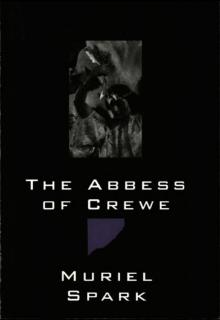 The Abbess of Crewe: A Modern Morality Tale
The Abbess of Crewe: A Modern Morality Tale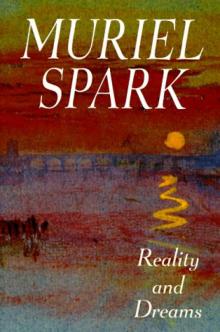 Reality and Dreams
Reality and Dreams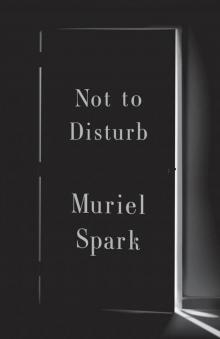 Not to Disturb
Not to Disturb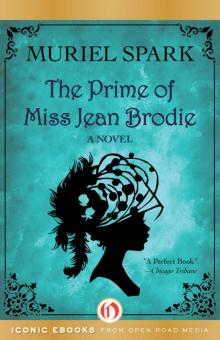 The Prime of Miss Jean Brodie
The Prime of Miss Jean Brodie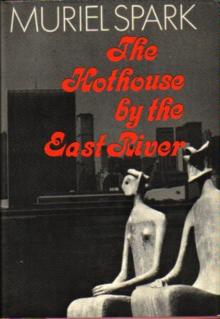 The Hothouse by the East River
The Hothouse by the East River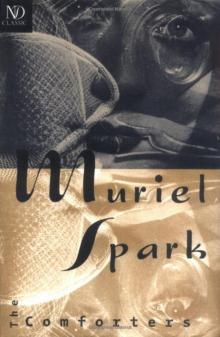 The Comforters
The Comforters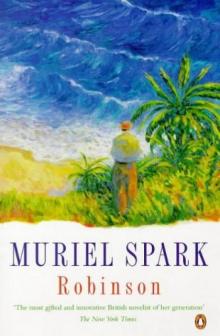 (1958) Robinson
(1958) Robinson Unknown
Unknown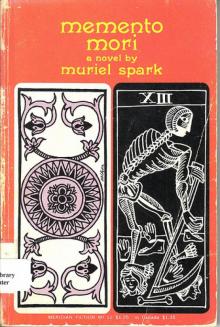 Memento Mori
Memento Mori The Finishing School
The Finishing School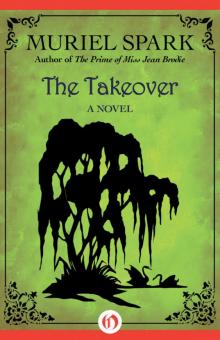 The Takeover
The Takeover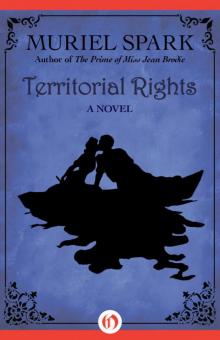 Territorial Rights
Territorial Rights The Complete Short Stories
The Complete Short Stories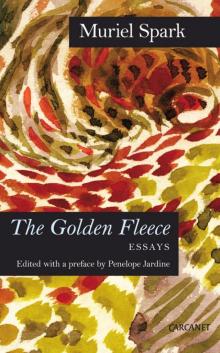 The Golden Fleece: Essays
The Golden Fleece: Essays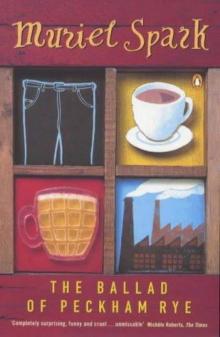 The Ballad of Peckham Rye
The Ballad of Peckham Rye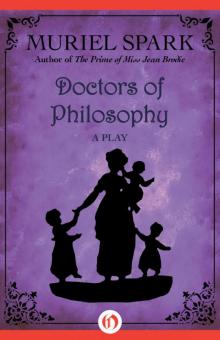 Doctors of Philosophy: A Play
Doctors of Philosophy: A Play The Mandelbaum Gate
The Mandelbaum Gate Loitering With Intent
Loitering With Intent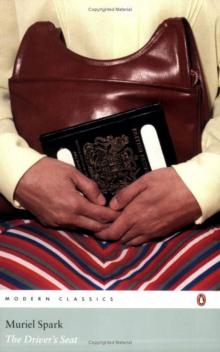 The Driver's Seat
The Driver's Seat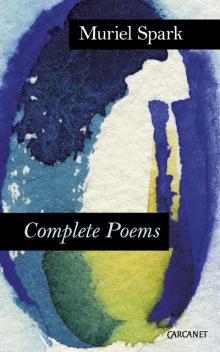 Complete Poems: Muriel Spark
Complete Poems: Muriel Spark Symposium
Symposium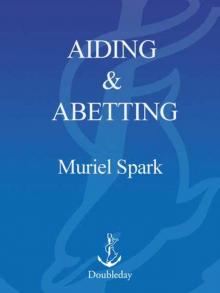 Aiding and Abetting
Aiding and Abetting The Golden Fleece
The Golden Fleece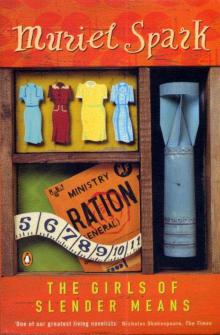 The Girls of Slender Means
The Girls of Slender Means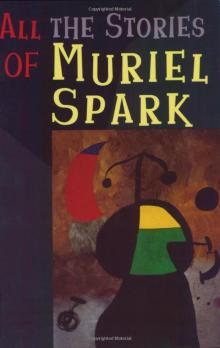 Alice Long’s Dachshunds
Alice Long’s Dachshunds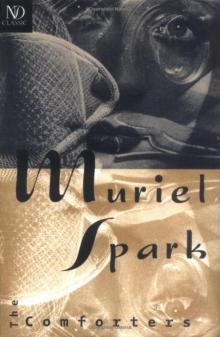 (1954) The Comforters
(1954) The Comforters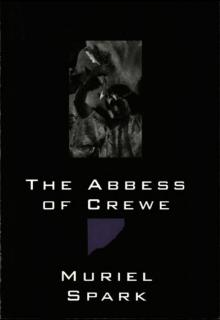 The Abbess of Crewe
The Abbess of Crewe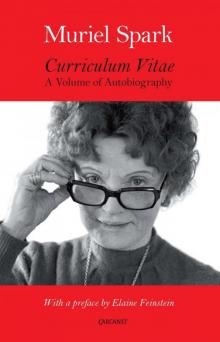 Curriculum Vitae
Curriculum Vitae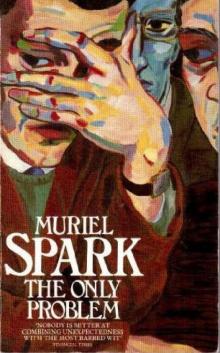 The Only Problem
The Only Problem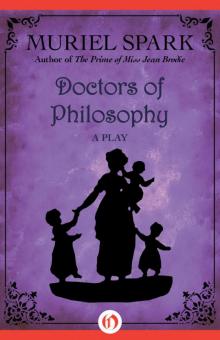 Doctors of Philosophy
Doctors of Philosophy